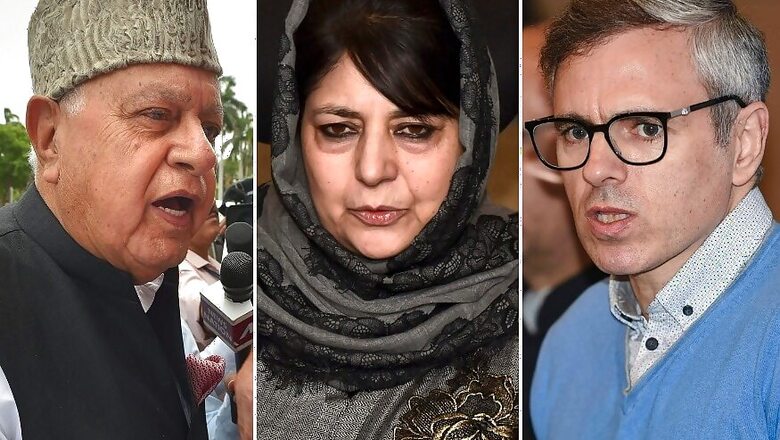
views
New Delhi: The Jammu and Kashmir administration has cited National Conference leader Omar Abdullah’s ability to “convince his electorate to vote in huge numbers” as one of the reasons for invoking the stringent Public Safety Act (PSA) against the former chief minister.
“The capacity of the subject to influence people for any cause can be gauged from the fact that he was able to convince his electorate to come out and vote in huge numbers even during the peak of militancy and poll boycotts,” a dossier prepared by the police said.
The dossier also referred to PDP leader Mehbooba Mufti as “Daddy’s girl” and “Kota Rani”, and accuses the ex-CM of making anti-national statements and extending support to organisations such as the Jamaat-e-Islamia, which has been banned under the Unlawful Activities (Prevention) Act (UAPA).
“(The) subject is recognised as hot-headed and scheming person, known for dangerous and insidious machinations…. She has been promoting separatism as corroborated by several confidential reports filed by (intelligence) agencies… The subject is referred, for her dangerous and insidious machinations and usurping profile and nature, by the masses as ‘Daddy’s girl’ and ‘Kota Rani’, based on the profile of a medieval queen of Kashmir, who rose to power by virtue of undertaking intrigues ranging from poisoning of her opponents to ponyardings (sic),” the document said in reference to Mufti.
Three Jammu and Kashmir chief ministers — National Conference leaders Farooq Abdullah and Omar Abdullah, and PDP chief Mehbooba Mufti — have been in detention since August 5 last year when the Narendra Modi government scrapped provisions of Article 370 and bifurcated the state into J&K and Ladakh union territories.
While Farooq Abdullah, a five-time chief minister and currently a member of the Lok Sabha, was booked under PSA last September, Omar and Mehbooba were booked under the stringent law on the night of February 6 this year, barely a few hours before their preventive detention was to end.
The grounds of detention against Omar Abdullah, who was J&K chief minister from 2009-14, state that on the eve of re-organisation of the state he had made attempts to provoke general masses against the dilution of articles 370 and 35-A.
The grounds also mention his comments on social networking sites to instigate common people against the decisions on Articles 370 and 35-A which had the potential of disturbing public order.
However, the police have neither mentioned any of Omar's social media posts in the dossier nor in the order for grounds of his detention.
"To the people of Kashmir, we don't know what is in store for us.......stay safe and above all please stay calm," were the last few tweets of Omar before he was taken to Hari Nivas for preventive detention.
To the people of Kashmir, we don’t know what is in store for us but I am a firm believer that what ever Almighty Allah has planned it is always for the better, we may not see it now but we must never doubt his ways. Good luck to everyone, stay safe & above all PLEASE STAY CALM.— Omar Abdullah (@OmarAbdullah) August 4, 2019
Violence will only play in to the hands of those who do not have the best interests of the state in mind. This wasn’t the India J&K acceded to but I’m not quite ready to give up hope yet. Let calm heads prevail. God be with you all.— Omar Abdullah (@OmarAbdullah) August 4, 2019
Restrictions have been put on communication links since August 5 last year. These were subsequently eased. Internet is functional at a few places through leased lines. Mobile internet facility has been made functional but with a speed of 2G with special instructions that it would not be used to access social media sites.
According to rules, preventive detention can be extended beyond six months only if an advisory board, constituted two weeks before the completion of the 180-day period, recommends that.
Mehbooba has been slapped with the PSA for her remarks which included challenging accession of Jammu and Kashmir to India in case the Article 370 was abrogated.
The statements of the former chief minister, whose party PDP was an ally of the BJP till June 2018, on security forces killing militants was also made a part of the PSA dossier against her.
Ironically, the PSA was enacted Farooq Abdullah’s father and Omar Abdullah’s grandfather Sheikh Abdullah in 1978 to fight timber smugglers in the state as they would easily get away with minimal detention those days.
Sheikh Abdullah brought the Act as a deterrent against timber smugglers as it provided a jail term, without a trial, for up to two years. However, this Act came in handy for the police and security forces during the early 1990s when militancy erupted in the state.
After then Union home minister Mufti Mohammed Sayeed enforced the controversial Armed Forces (Special Powers) Act in the state in 1990, authorities used the PSA to detain people.
The Act was amended in 2012 and some of its stricter provisions were relaxed. After the amendment, period up to which a first-time offender or individual can be put in detention without trial was reduced from two years to three months.




















Comments
0 comment